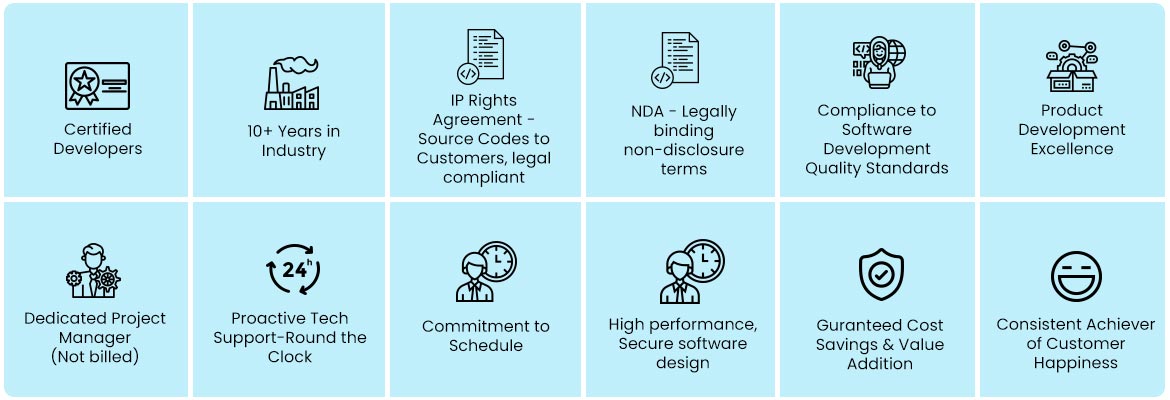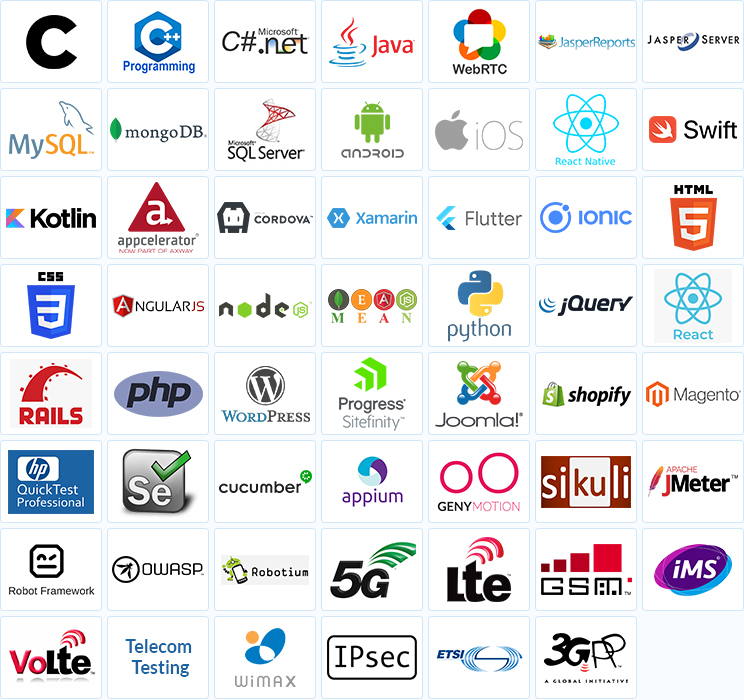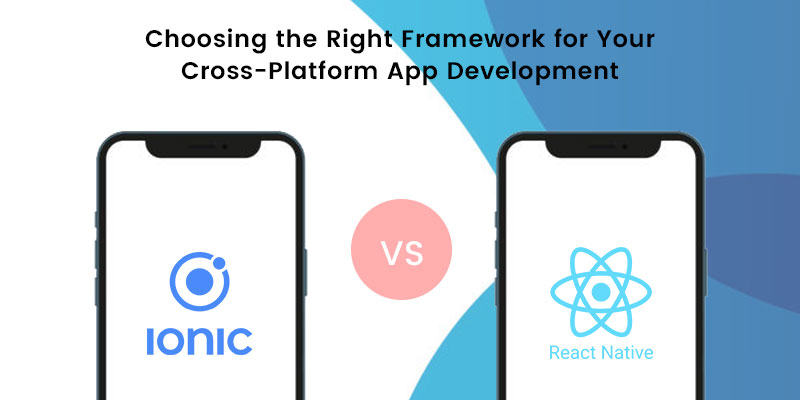Introduction
Ionic and React Native are two of the most popular frameworks used for building mobile applications. Ionic is a hybrid framework that uses web technologies such as HTML, CSS, and JavaScript to create mobile apps that can run on both iOS and Android platforms. On the other hand, React Native is a JavaScript framework that allows developers to build native mobile apps for iOS and Android platforms using a single codebase.The reason for analyzing ionic vs react native is that they are both widely used and have their own unique advantages and disadvantages. By comparing the features and capabilities of Ionic and React Native, developers can make the right decision about which framework is best suited for their particular project.
In this blog, we'll dive into the key differences in Ionic vs React Native to help you decide which one is the right choice for your next mobile app development project.
Ionic
Ionic is a popular hybrid mobile app development framework that allows developers to create mobile apps using web technologies such as HTML, CSS, and JavaScript. The framework is built on top of Angular, a popular JavaScript framework, and provides a range of UI components and themes to help developers create visually appealing and interactive mobile apps. Ionic is often used for building cross-platform mobile applications, meaning that a single codebase can be used to create apps that run on both iOS and Android platforms.Ionic uses Cordova, a platform that allows developers to build native plugins and access native device functionality, to interact with the native device features like camera, GPS, and more. With its easy-to-use command-line interface, Ionic offers a streamlined development experience for web developers looking to create mobile applications.
Development Language Used for Ionic
Ionic uses a combination of web technologies such as:HTML- is used for creating the app's structure
CSS - is used for styling
JavaScript - is used for app logic and functionality
Ionic also uses Angular, a popular JavaScript framework for building web applications, as its default framework for building complex and scalable mobile apps. However, developers can also use other frameworks such as React or Vue with Ionic. In addition, Ionic offers a set of pre-built UI components that are optimized for mobile devices, making it easier for developers to create visually appealing and responsive apps.
Development Tools Used for Ionic
Ionic CLI: The Ionic Command Line Interface (CLI) is a powerful tool that allows developers to create, build, test, and deploy Ionic apps. It provides a range of features such as generating new projects, adding new pages and components, and managing plugins.Visual Studio Code: Visual Studio Code is a popular code editor that provides a range of features for Ionic app development, including syntax highlighting, code completion, and debugging. It also provides extensions for Ionic development, such as the Ionic Framework Snippets extension, which provides snippets for commonly used Ionic components.
Angular: As Ionic is built on top of Angular, developers can use the Angular framework for building Ionic apps. Angular provides a range of features for building complex web applications, including data binding, dependency injection, and routing.
Cordova: Ionic uses Cordova to access native device functionality, such as camera, GPS, and more. Cordova provides a range of plugins that can be used with Ionic to add native functionality to the app.
Ionic Appflow: Ionic Appflow is a cloud-based platform that provides a range of features for building, testing, and deploying Ionic apps. It includes features such as automated builds, app analytics, and app deployment to app stores.
Performance
As a hybrid framework, it relies on webviews to render the UI components, which can impact its performance when compared to native apps. However, Ionic uses Cordova, a platform that allows developers to access native device functionality, to provide a native-like experience.The performance of an Ionic app largely depends on the performance of the underlying device and the complexity of the app. While Ionic can provide good performance for simple and lightweight apps, it may struggle with more complex and heavy apps.
Community and Support
Ionic Forum: The Ionic Forum is an online community where developers can ask questions, share knowledge, and get support from other Ionic developers. The forum is active and has a large community of developers who are willing to help and share their experiences.Ionic Documentation: The Ionic Documentation is a comprehensive guide that covers everything from getting started with Ionic to advanced topics such as theming, routing, and deployment. The documentation is well-organized and easy to navigate, making it a great resource for both beginners and experienced developers.
Ionic Blog: The Ionic Blog provides regular updates on the latest features, tools, and best practices for Ionic development. It also includes tutorials and case studies that showcase how other developers are using Ionic to build their apps.
Ionic Academy: The Ionic Academy is a website that provides video tutorials, courses, and resources for Ionic development. It includes topics such as UI design, navigation, and data storage, and provides a great way for developers to learn and improve their Ionic skills.
Stack Overflow: Stack Overflow is a popular Q&A site where developers can ask and answer technical questions related to Ionic development. It has a large community of developers who are willing to help and share their knowledge, making it a great resource for troubleshooting issues and finding solutions to problems.
Cost and Licensing
Ionic is an open-source framework that is available for free under the MIT license. This means that developers can use Ionic to build and distribute their apps without paying any licensing fees. The MIT license also allows developers to modify and distribute the Ionic framework and its code without any restrictions.However, there may be costs associated with using Ionic, depending on the specific tools and services that developers use to build their apps. For example, developers may need to pay for hosting services or third-party plugins and integrations. Additionally, if developers choose to use the Ionic Pro service for app development and deployment, they may need to pay a monthly subscription fee.
React Native
React Native is a popular JavaScript-based mobile app development framework that allows developers to build native mobile apps for iOS and Android platforms using a single codebase. It is based on Facebook's popular React framework, and uses a combination of JavaScript and native code to create high-performance, native mobile apps.React Native allows developers to build complex mobile apps with a focus on performance, speed, and reliability. It provides a set of pre-built components and libraries that can be easily integrated into the app. Additionally, React Native allows developers to use hot reloading, which means that they can see the changes they make in the app in real-time, without having to recompile or reload the app.
Development Language Used for React Native
However, React Native uses a different approach to building apps than traditional web development. It uses a combination of JavaScript and native code to create high-performance, native mobile apps. Developers can use React Native to create reusable UI components that can be used across different platforms. Additionally, React Native provides a hot-reloading feature that allows developers to see the changes they make in the app in real-time, without having to recompile or reload the app.Development Tools Used for React Native
React Native CLI: The React Native Command Line Interface (CLI) is a tool that allows developers to create, build, test, and deploy React Native apps. It provides a range of features such as generating new projects, adding new screens and components, and managing plugins.Visual Studio Code: Visual Studio Code is a popular code editor that provides a range of features for React Native app development, including syntax highlighting, code completion, and debugging. It also provides extensions for React Native development, such as the React Native Tools extension, which provides debugging support.
Expo: Expo is a set of tools and services that provide a fast and easy way to build and deploy React Native apps. It includes features such as live reloading, over-the-air updates, and easy integration with native APIs.
Xcode and Android Studio: Xcode is an integrated development environment (IDE) for macOS that allows developers to build iOS apps, while Android Studio is an IDE for building Android apps. Both IDEs are required for building and testing React Native apps on their respective platforms.
Redux: Redux is a state management library for JavaScript that is commonly used with React Native. It provides a predictable and centralized way of managing the state of an app, making it easier to debug and maintain.
Performance
React Native is a JavaScript-based mobile app development framework that uses a combination of JavaScript and native code to build high-performance, native mobile apps. By using native components, React Native provides a native-like experience, which can result in faster and smoother performance when compared to hybrid apps.React Native also provides a set of performance optimization tools and libraries that can help developers improve the performance of their apps. For example, the React Native Performance Monitor allows developers to track the performance of their app in real-time and identify areas that need optimization. Additionally, React Native provides a hot-reloading feature that can speed up the development process and improve productivity.
Community and Support
React Native Community: The React Native Community is a collaborative organization that provides a range of resources and support for React Native developers. It includes open-source libraries, components, tools, and tutorials, and is dedicated to making React Native development easier and more accessible.React Native Documentation: The React Native Documentation is a comprehensive guide that covers everything from getting started with React Native to advanced topics such as performance optimization and debugging.
React Native Facebook Group: The React Native Facebook Group is a community where developers can ask questions, share knowledge, and get support from other React Native developers. The group is active and has a large community of developers who are willing to help and share their experiences.
React Native School: React Native School is a website that provides video tutorials, courses, and resources for React Native development. It includes topics such as UI design, navigation, and data storage, and provides a great way for developers to learn and improve their React Native skills.
Stack Overflow: Stack Overflow is a popular Q&A site where developers can ask and answer technical questions related to React Native development. It has a large community of developers who are willing to help and share their knowledge, making it a great resource for troubleshooting issues and finding solutions to problems.
Cost and Licensing
React Native is also an open-source framework that is available for free under the MIT license. This means that developers can use React Native to build and distribute their apps without paying any licensing fees. The MIT license also allows developers to modify and distribute the React Native framework and its code without any restrictions.However, there may be costs associated with using React Native, depending on the specific tools and services that developers use to build their apps. For example, developers may need to pay for hosting services or third-party plugins and integrations. Additionally, if developers choose to use the Expo service for app development and deployment, they may need to pay a monthly subscription fee.
Conclusion
In conclusion, both Ionic and React Native are popular and powerful frameworks for building cross-platform mobile applications. Ionic offers a wider range of pre-built UI components, making it easier and quicker to create visually appealing apps. On the other hand, React Native provides better performance and a smoother user experience due to its native rendering capabilities. It also has a larger community and more mature ecosystem with a wide range of third-party libraries and tools available.In the battle of Ionic vs React Native, developers need to consider their specific project requirements, development skills, and resources available. Both frameworks have their strengths and weaknesses, and it's important to choose the one that fits best with the needs of the project.
At OdiTek Solutions, we possess a skilled team of developers who are experienced in working with both Ionic and React Native frameworks. Our team has already delivered multiple successful projects.
If you're planning to undertake an application development project and require developers proficient in React Native or Ionic, feel free to contact us!
What OdiTek offers

Refer our Skills page:

React Native
A brand new technology, React Native is the cross-platform mobile app development solution for iOS and Android. With the launch of this advanced technology, the huge mobile app development industry is transforming and providing ultimate speed and efficiency to their services at lower costs. React...
more












